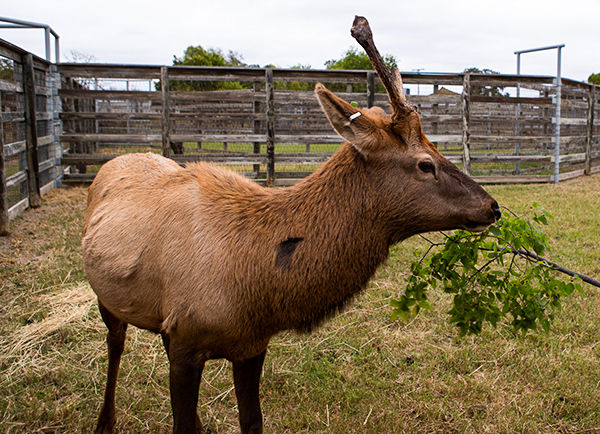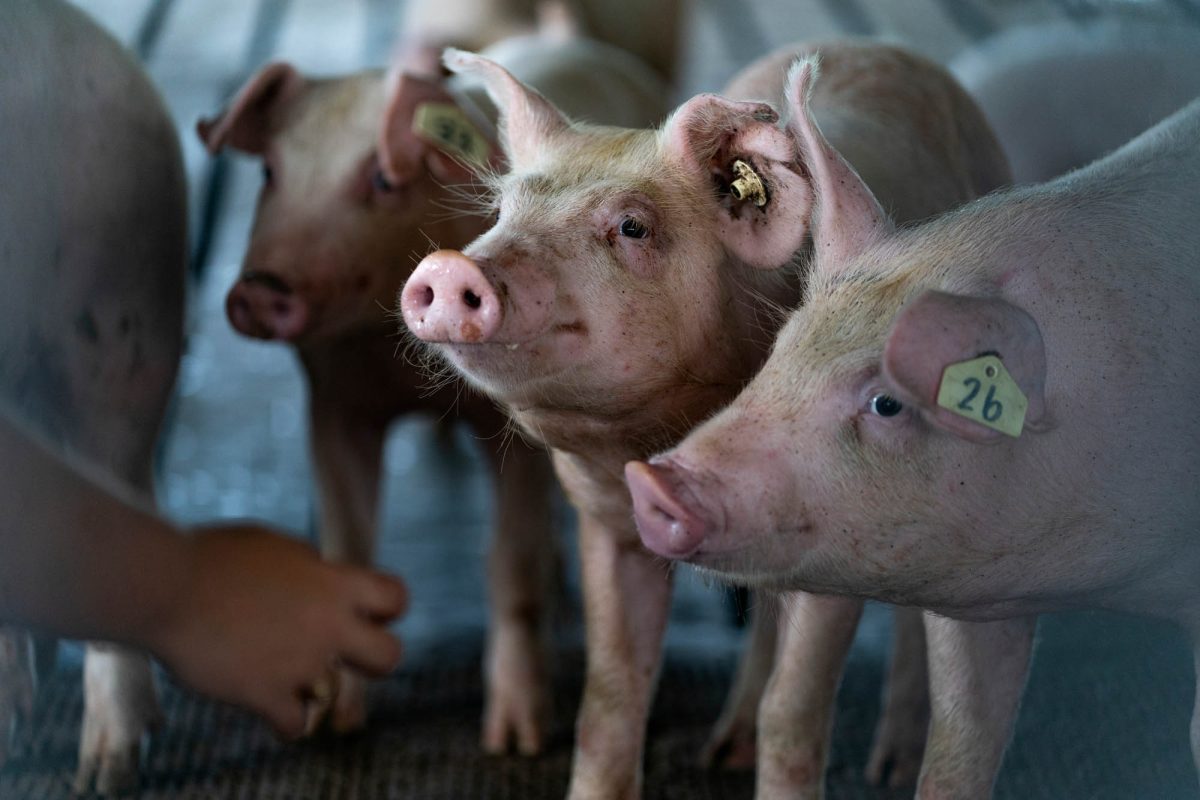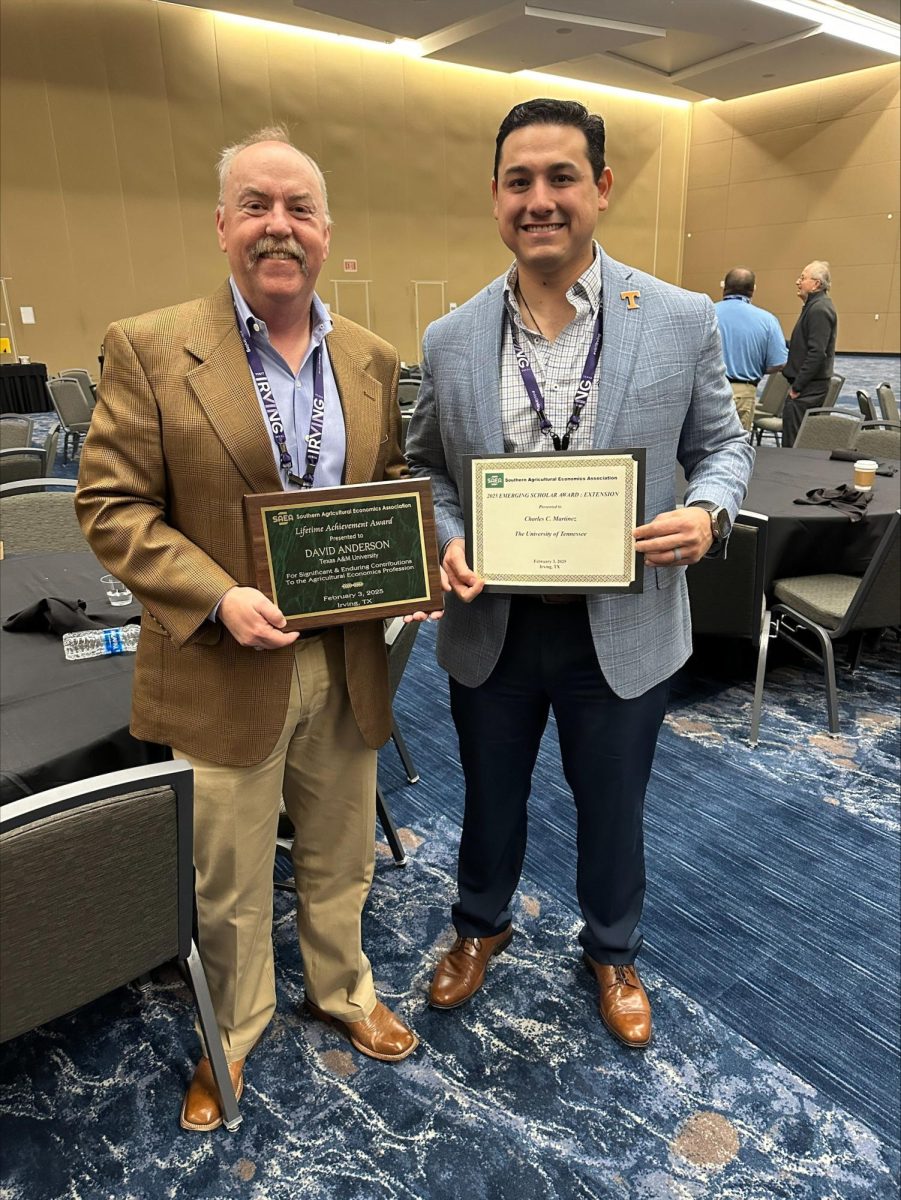Waldo Elliott the Elk made a big name for himself in Idaho. He recently made his College Station debut in October at the Winnie Carter Wildlife Center, a research center that is part of Texas A&M’s veterinarian school.
Likely abandoned by his parents at a young age, Elliott was taken into the care of locals who found him on the side of the road. He was initially released into the National Forest in Idaho, but kept finding his way back to people instead of the other elk in the forest. In College Station, Waldo Elliott will help inform students about elk and spread a few smiles.
Clinical assistant professor and veterinarian Alice Blue-McLendon said Waldo was a special case from the beginning because he was not raised like other elks.
“He was orphaned,” Blue-McLendon said. “He needed to come live in captivity. He found hunters within two days when he was released. They were quite enamored with him, and they ended up protecting him because he was cleary hand-raised.”
Gabriella Quintana, supervising wildlife technician, said Blue-McLendon brought up the idea of bringing Waldo Elliott to her in College Station to see if it would be a good fit.
“She asked me, ‘Do you think we can provide a good home for him?’” Quintana said. “We thought this would be a good place for him. I think we’re the perfect opportunity for him to teach about another cervid species.”
As a result of his unconventional upbringing, Quintana said Waldo Elliott should be raised in captivity, rather than being released back into the wild.
“He was raised by humans, so he is more comfortable with humans than he was ever going to be with elk,” Quintana said. “That’s just going to happen when you raise a wild species like that.”
It was not easy, according to Blue-McLendon, to get Waldo Elliott to College Station. There are very strict rules pertaining to transfer of large game across state lines.
“It took a lot of regulatory involvement from the Texas Animal Health Commision and the USDA veterinary services because there is a lot of regulation to move elk,” Blue-McLendon said.
Blue-McLendon said his friendliness has not been lost in the move to Texas, and Waldo Elliott is still eager to see humans.
“When you go out to his enclosure, he comes right up to you,” Blue-McLendon said. “He likes human contact, he seeks human contact. He seems to be quite mystified by the ostrich in the next enclosure. He can even see Kyle Field from his enclosure.”
Quintana said Waldo Elliott enjoys playing with the different objects in his enclosure and has a tendency to be quite mischievous.
“He has a lot of personality, that’s for sure,” Quintana said. “He’s a troublemaker I would like to say. He likes to mess around with things. We’ve fixed his water hose a countless number of times because he likes to play with it.”
Quintana said his social habits are not the only interesting thing about this animal. He likes human food just as much as he likes humans. This is because when Idaho Fish and Game was moving him to the National Forest, they lured him into the trailer with tortilla chips.
“He really loves rose bushes,” Quintana said. “He loves all different kinds of plants. [Whoever] got him, they said loved Doritos or loved chips. So when we got him to try to start forming a bond, start getting him trained and working with him, we used chips.”
Blue-McLendon said even though he is very friendly, Waldo Elliott is a male elk in puberty, which does make him dangerous. She said certain periods of his life may make him more dangerous, such as when he is in rut, which is his mating season.
“Idaho Fish and Game made the right decision to put him in captivity,” Blue-McLendon said. “They were compassionate and wanted to find him a place to live forever. I think we’re a great place for him because we are used to animals that are dangerous.”
As the Winnie Carter Wildlife Center is a research center not open to the public, Waldo Elliott will be used by veterinary students to study large game and learn how to care for such animals., according to Blue-McLendon.
“He’ll just be an ambassador animals to teach students about elk, to teach them about male animals that are raised by humans,” Blue-McLendon said. “They will also learn how to care for those animals. We think of it as providing sanctuary for him for the rest of his life.”
New hooves in town
December 5, 2019

Photo by Provided
Waldo Elliott the Elk
0
Donate to The Battalion
$2790
$5000
Contributed
Our Goal
Your donation will support the student journalists of Texas A&M University - College Station. Your contribution will allow us to purchase equipment and cover our annual website hosting costs, in addition to paying freelance staffers for their work, travel costs for coverage and more!
More to Discover









